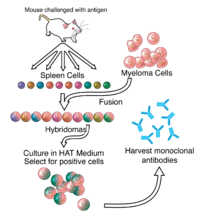
Photo from wikipedia
Modulating the PD-L1/PD-1 axis in man through function blocking antibodies can release potent anti-tumor immunity, leading to durable objective responses across multiple tumor types. Here we describe the discovery and… Click to show full abstract
Modulating the PD-L1/PD-1 axis in man through function blocking antibodies can release potent anti-tumor immunity, leading to durable objective responses across multiple tumor types. Here we describe the discovery and preclinical characterization of LY3300054, a fully human IgG1λ antibody capable of binding human PD-L1 with high affinity and inhibiting binding to its two cognate receptors, PD-1 and CD80. LY3300054 is an antagonist monoclonal antibody recognizing human PD-L1 with high affinity (KD 0.08 nM), selected and derived from a scFv phage library. LY3300054 was engineered and expressed as an IgG1-Fc null monoclonal antibody to ablate immune effector function. Multiple in vitro assays, including mixed leukocyte reaction (MLR) and tetanus toxoid recall assay were utilized to demonstrate LY3300054 potent functional activity in enhancing the activation of primary human T cells in culture. The biological activity of LY3300054 on T cells was also shown to be enhanced by co-administration of anti-CTLA4 mAb (ipilimumab) in MLR. Further, we evaluated LY3300054 activity in vivo using xenograft mouse tumor models reconstituted with human immune cells. LY3300054 demonstrated anti-tumor activity in both NCI-H292 xenografts co-implanted with human PBMCs and HCC827 xenograft model upon infusion of human T cells. LY3300054 in vivo activity was also tested in HCC827- and Ov79-bearing immunodeficient NSG/NOG mice reconstituted with human hematopoietic stem cells. In this setting, LY3300054 displayed robust anti-tumor and immunomodulatory effects exemplified by T cell inflamed phenotype in the tumor and peripheral tissues. High-content molecular profiling identified distinct gene expression changes indicative of T cell activation in all models tested. A mutational strategy based on integrating the PD-1/PD-L1 structure data with the orthologous sequence data of PD-L1 has identified a residue on PD-L1, which is part of the PD-L1/PD-1 interface, that is critical for the species specificity of LY3300054. This study demonstrates that LY3300054 is novel anti-PD-L1 monoclonal antibody, capable of potently enhancing human T cell function both in vitro and in vivo, and provides previously not described insights into the effects of PD-L1 blockade on the intra- and extra-tumoral immune response. LY3300054 is currently under clinical evaluation in monotherapy and combination with other therapeutic modalities in multiple tumor types (NCT02791334; NCT03099109; NCT02791334; NCT02791334) Citation Format: Carmine Carpenito, Yiwen Li, George X. Wang, Maria S. Malabunga, Jaafar N. Haidar, Amelie Forest, Mary Y. Murphy, Gerald E. Hall, Cindy Wang, Leyi Shen, Andreas Sonyi, Darin Chin, Anthony L. Pennello, Ivan V. Inigo, David Surguladze, Yung-mae Yao, Douglas Burtrum, Ruslan D. Novosiadly, Kris Persaud, Dale L. Ludwig, Michael D. Kalos. Preclinical characterization of the anti-PD-L1 monoclonal antibody LY3300054 [abstract]. In: Proceedings of the American Association for Cancer Research Annual Meeting 2018; 2018 Apr 14-18; Chicago, IL. Philadelphia (PA): AACR; Cancer Res 2018;78(13 Suppl):Abstract nr 2730.
Journal Title: Cancer Research
Year Published: 2018
Link to full text (if available)
Share on Social Media: Sign Up to like & get
recommendations!